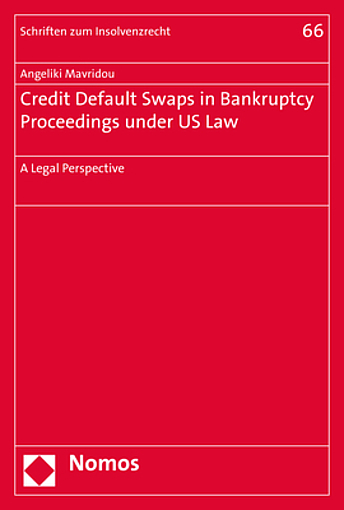englischThe presence of undisclosed CDS positions in bankruptcy proceedings has been thoroughly examined in previous research. Various economic scholars argued that the creation of silent short positions in reorganizations can impair the successful confirmation of a reorganization plan. US legislators responded with the 2011 amendments to Bankruptcy Rule 2019 imposing an obligation on groups or committees of creditors in Chapter 11 cases to disclose any short position, including CDS positions.
The question that remains open is whether the limited disclosure requirement embedded in Bankruptcy Rule 2019 suffices to safeguard the fair and equitable distribution of a debtor’s assets pursuant to the principles and provisions of bankruptcy law. The study therefore examines the legal inconsistencies that can occur from individual, undisclosed CDS positions, particularly with regard to the pari passu principle and the Chapter 11 provisions regarding the legitimate acceptance and confirmation of a reorganization plan.
Conclusively, the study reviews whether such potential inconsistencies are imminent enough to justify the introduction of an expanded disclosure obligation.
Die negativen Auswirkungen stiller CDS-Kurzpositionen auf das „Kapitel 11“ Verfahren des US-amerikanischen Insolvenzrechtes wurden in Wirtschaftsstudien ausführlich untersucht und belegt. Um die sich daraus ergebenden widrigen Umstände im Rahmen des „Kapitel 11“-Verfahrens zu mindern, führte der US-Gesetzesgeber mittels der 2011 modifizierten Bankruptcy Rule 2019 eine entsprechende Anmeldepflicht ein, die sich jedoch nur auf Gläubigerkomitees bezieht.
Die Studie untersucht vor diesem Hintergrund, ob die limitierte Anmeldepflicht ausreicht, um die gemeinschaftliche Befriedigung der Gläubiger eines Schuldners nach den Rechtsprinzipien und Vorschriften des US-amerikanischen Insolvenzrechtes zu gewährleisten: Stille CDS Einzelgläubigerpositionen werden auf ihre Rechtmäßigkeit hinsichtlich des insolvenzrechtlichen Gleichberechtigungsgebots sowie der Vorschriften des „Kapitel 11“ Verfahrens bzgl. der rechtlichen Annahme und Bestätigung eines Insolvenzplanes geprüft. Sich daraus ergebenden potentiellen Rechtswidrigkeiten werden vor dem Hintergrund einer Erweiterung der gegenwärtigen Anmeldepflichten diskutiert.


